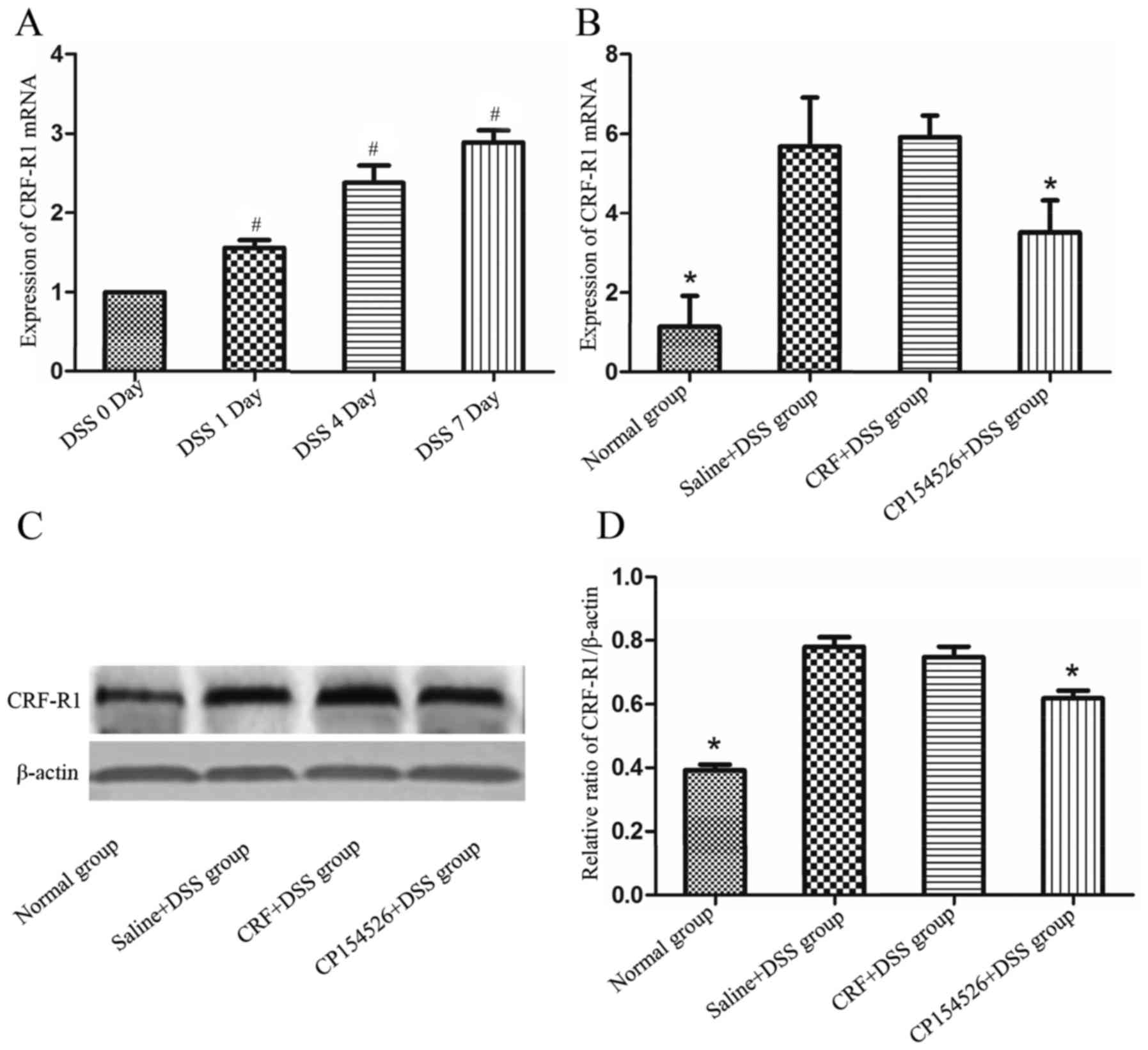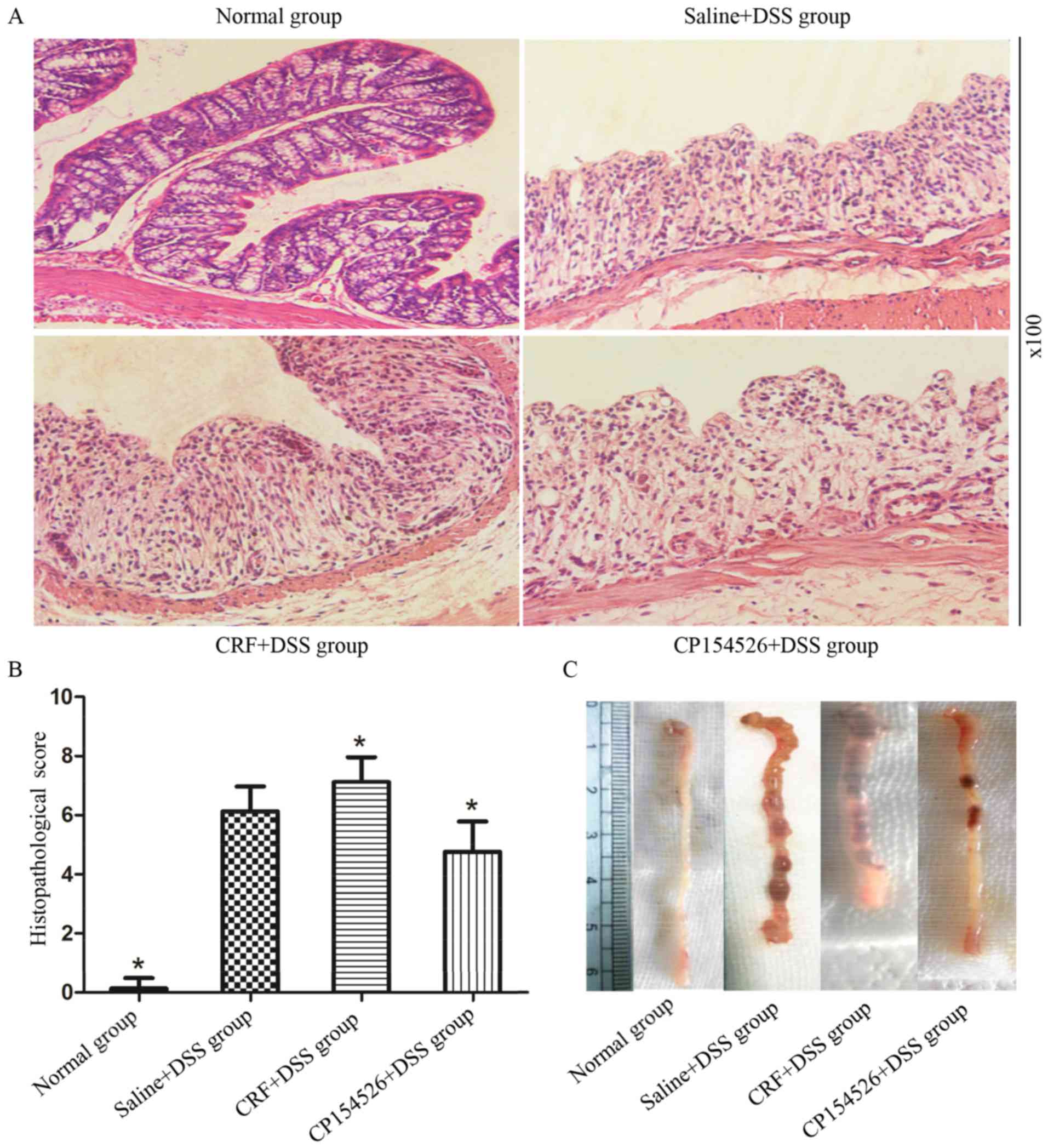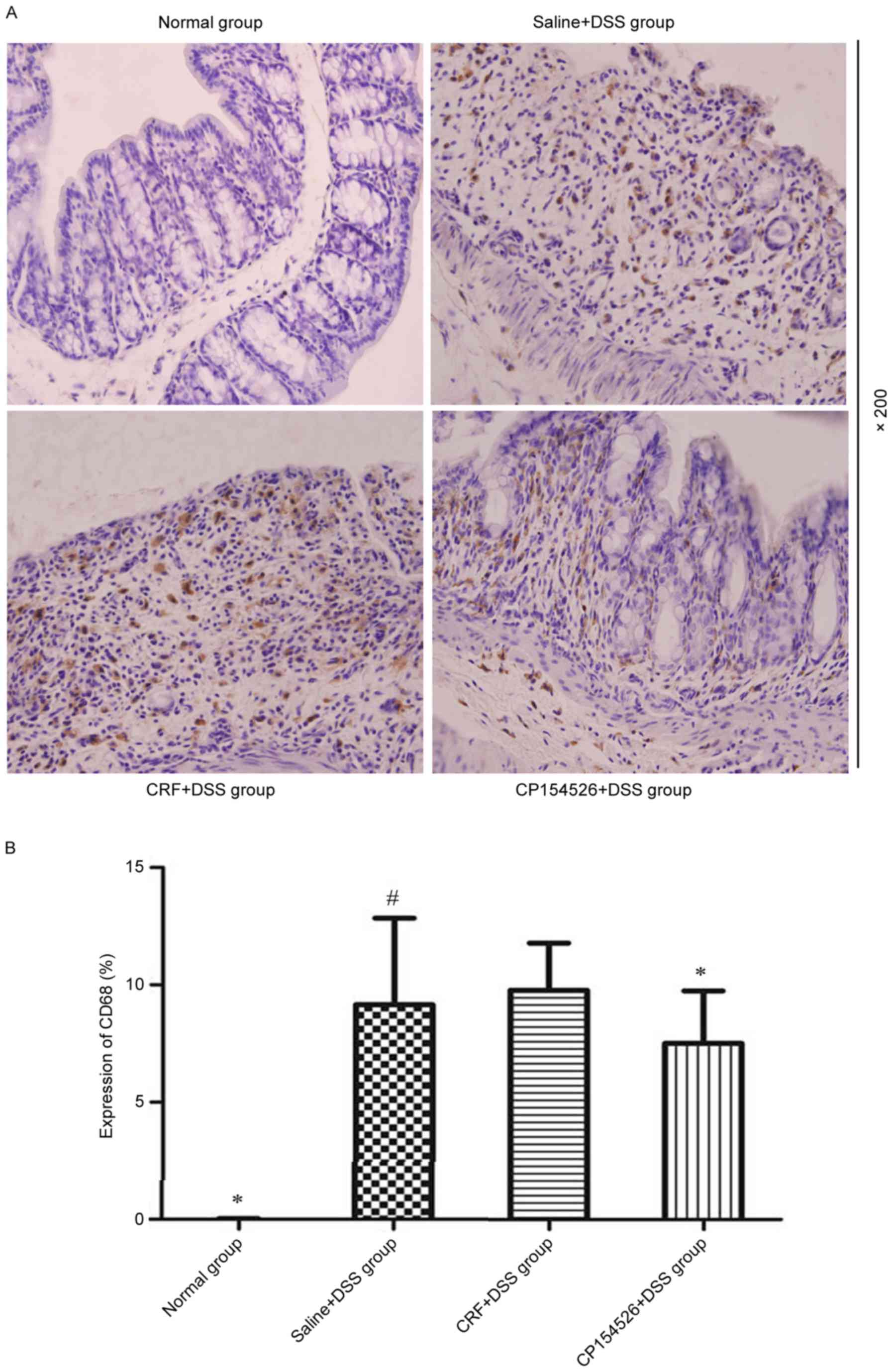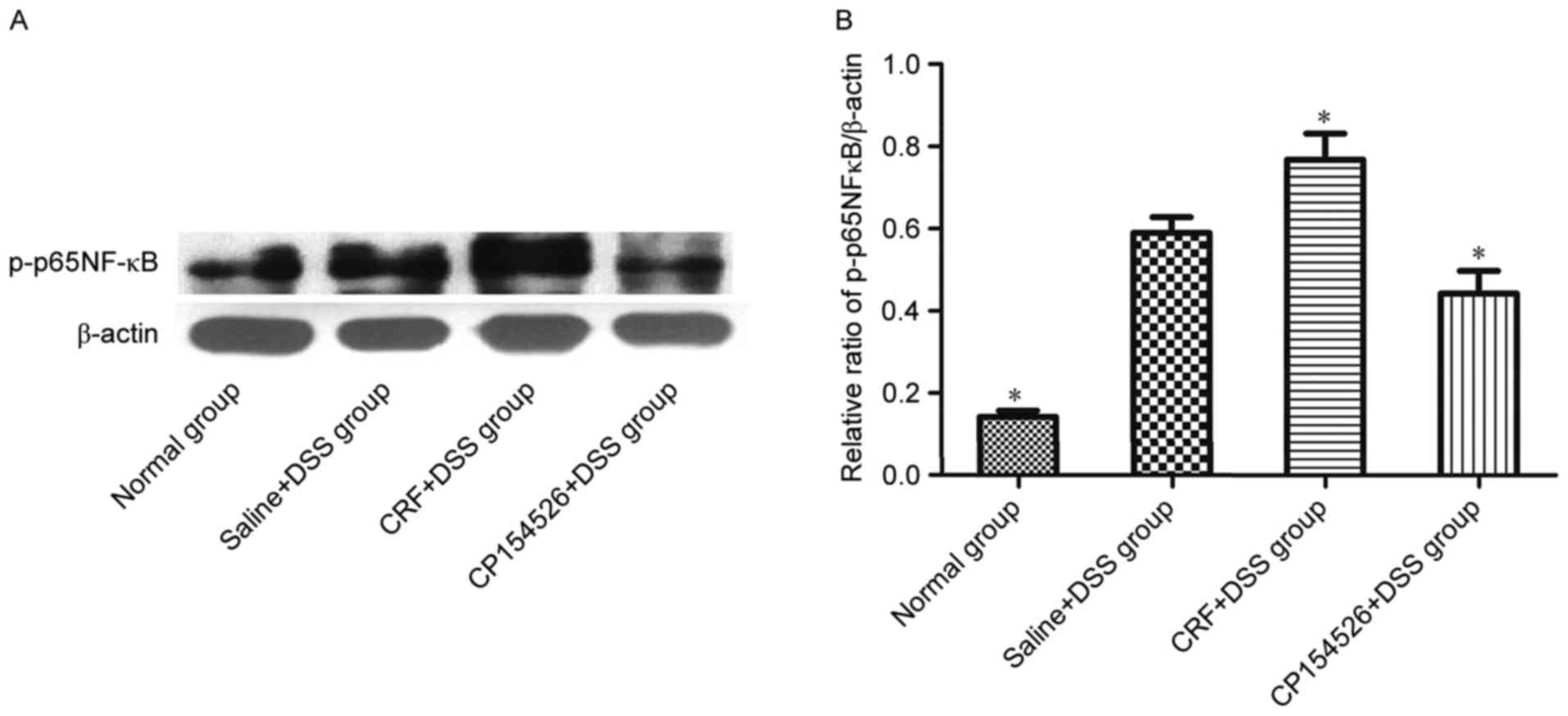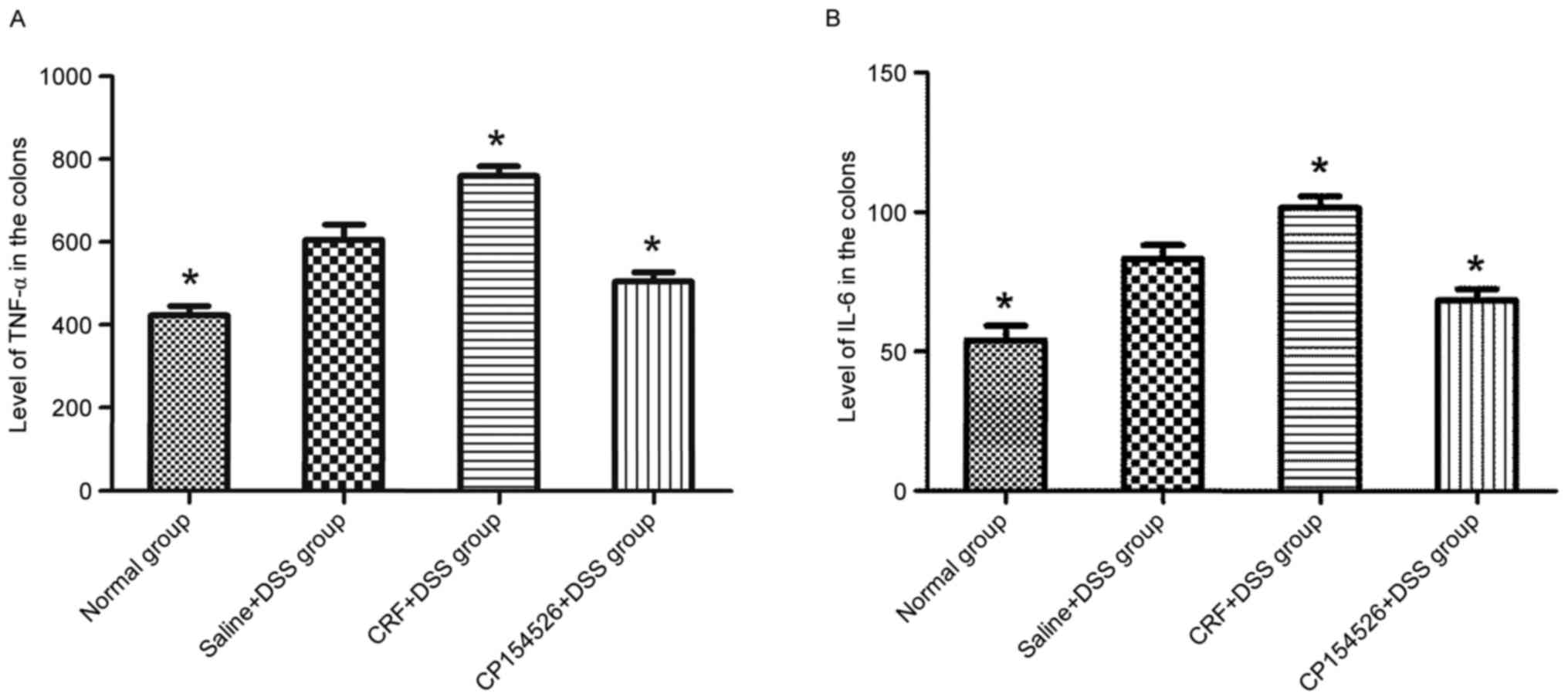|
1
|
Mawdsley JE and Rampton DS: Psychological
stress in IBD: New insights into pathogenic and therapeutic
implications. Gut. 54:1481–1491. 2005. View Article : Google Scholar : PubMed/NCBI
|
|
2
|
Taché Y, Kiank C and Stengel A: A role for
corticotropin-releasing factor in functional gastrointestinal
disorders. Curr Gastroenterol Rep. 11:270–277. 2009. View Article : Google Scholar : PubMed/NCBI
|
|
3
|
Taché Y and Bonaz B:
Corticotropin-releasing factor receptors and stress-related
alterations of gut motor function. J Clin Invest. 117:33–40. 2007.
View Article : Google Scholar : PubMed/NCBI
|
|
4
|
Overman EL, Rivier JE and Moeser AJ: CRF
induces intestinal epithelial barrier injury via the release of
mast cell proteases and TNF-α. PLoS One. 7:e399352012. View Article : Google Scholar : PubMed/NCBI
|
|
5
|
Buckinx R, Adriaensen D, Nassauw LV and
Timmermans JP: Corticotrophin-releasing factor, related peptides,
and receptors in the normal and inflamed gastrointestinal tract.
Front Neurosci. 5:542011. View Article : Google Scholar : PubMed/NCBI
|
|
6
|
Baker C, Richards LJ, Dayan CM and Jessop
DS: Corticotropin-releasing hormone immunoreactivity in human T and
B cells and macrophages: Colocalization with arginine vasopressin.
J Neuroendocrinol. 15:1070–1074. 2003. View Article : Google Scholar : PubMed/NCBI
|
|
7
|
Kawahito Y, Sano H, Kawata M, Yuri K,
Mukai S, Yamamura Y, Kato H, Chrousos GP, Wilder RL and Kondo M:
Local secretion of corticotropin-releasing hormone by
enterochromaffin cells in human colon. Gastroenterology.
106:859–865. 1994. View Article : Google Scholar : PubMed/NCBI
|
|
8
|
Yuan PQ, Wu SV, Elliott J, Anton PA,
Chatzaki E, Million M and Taché Y: Expression of corticotropin
releasing factor receptor type 1 (CRF1) in the human
gastrointestinal tract and upregulation in the colonic mucosa in
patients with ulcerative colitis. Peptides. 38:62–69. 2012.
View Article : Google Scholar : PubMed/NCBI
|
|
9
|
Agelaki S, Tsatsanis C, Gravanis A and
Margioris AN: Corticotropin-releasing hormone augments
proinflammatory cytokine production from macrophages in vitro and
in lipopolysaccharide-induced endotoxin shock in mice. Infect
Immun. 70:6068–6074. 2002. View Article : Google Scholar : PubMed/NCBI
|
|
10
|
Liu Y, Fang X, Yuan J, Sun Z, Li C, Li R,
Li L, Zhu C, Wan R, Guo R, et al: The role of
corticotropin-releasing hormone receptor 1 in the development of
colitis-associated cancer in mouse model. Endocr Relat Cancer.
21:639–651. 2014. View Article : Google Scholar : PubMed/NCBI
|
|
11
|
Chang J, Adams MR, Clifton MS, Liao M,
Brooks JH, Hasdemir B and Bhargava A: Urocortin 1 modulates
immunosignaling in a rat model of colitis via
corticotropin-releasing factor receptor 2. Am J Physiol
Gastrointest Liver Physiol. 300:G884–G894. 2011. View Article : Google Scholar : PubMed/NCBI
|
|
12
|
Chaniotou Z, Giannogonas P, Theoharis S,
Teli T, Gay J, Savidge T, Koutmani Y, Brugni J, Kokkotou E,
Pothoulakis C and Karalis KP: Corticotropin-releasing factor
regulates TLR4 expression in the colon and protects mice from
colitis. Gastroenterology. 139:2083–2092. 2010. View Article : Google Scholar : PubMed/NCBI
|
|
13
|
Cantarella G, Lempereur L, Lombardo G,
Chiarenza A, Pafumi C, Zappla G and Bernadini R: Divergent effects
of corticotropin releasing hormone on endothelial cell nitric oxide
synthase are associated with different expression of CRH type 1 and
2 receptors. Br J Pharmacol. 134:837–844. 2001. View Article : Google Scholar : PubMed/NCBI
|
|
14
|
Dieleman LA, Palmen MJ, Akol H, Bloemena
E, Peña AS, Meuwissen SG and Van Rees EP: Chronic experimental
colitis induced by dextran sulphate sodium (DSS) is characterized
by Th1 and Th2 cytokines. Clin Exp Immunol. 114:385–391. 1998.
View Article : Google Scholar : PubMed/NCBI
|
|
15
|
Mahida YR, Wu K and Jewell DP: Enhanced
production of interleukin 1-beta by mononuclear cells isolated from
mucosa with active ulcerative colitis of Crohn's disease. Gut.
30:835–838. 1989. View Article : Google Scholar : PubMed/NCBI
|
|
16
|
Tsatsanis C, Androulidaki A, Dermitzaki E,
Charalampopoulos I, Spiess J, Gravanis A and Margioris AN:
Urocortin 1 and urocortin 2 induce macrophage apoptosis via CRFR 2.
FEBS Lett. 579:4259–4264. 2005. View Article : Google Scholar : PubMed/NCBI
|
|
17
|
Tsatsanis C, Androulidaki A, Dermitzaki E,
Gravanis A and Margioris AN: Corticotropin releasing factor
receptor 1 (CRF 1) and CRF 2 agonists exert an anti-inflammatory
effect during the early phase of inflammation suppressing
LPS-induced TNF-alpha release from macrophages via induction of
COX-2 and PGE2. J Cell Physiol. 210:774–783. 2007. View Article : Google Scholar : PubMed/NCBI
|
|
18
|
Neurath MF, Pettersson S, zum Büschenfelde
Meyer KH and Strober W: Local administration of antisense
phosphorothioate oligonucleotides to the p65 subunit of NF-kappa B
abrogates established experimental colitis in mice. Nat med.
2:998–1004. 1996. View Article : Google Scholar : PubMed/NCBI
|
|
19
|
Rogler G, Brand K, Vogl D, Page S,
Hofmeister R, Andus T, Knuechel R, Baeuerle PA, Schölmerich J and
Gross V: Nuclear factor kappaB is activated in macrophages and
epithelial cells of inflamed intestinal mucosa. Gastroenterology.
115:357–369. 1998. View Article : Google Scholar : PubMed/NCBI
|
|
20
|
Tsatsanis C, Androulidaki A, Alissafi T,
Charalampopoulos I, Dermitzaki E, Roger T, Gravanis A and Margioris
AN: Corticotropin-releasing factor and the urocortins induce the
expression of TLR4 in macrophages via activation of the
transcription factors PU.1 and AP-1. J Immunol. 176:1869–1877.
2006. View Article : Google Scholar : PubMed/NCBI
|
|
21
|
Teitelbaum AA, Gareau MG, Jury J, Yang PC
and Perdue MH: Chronic peripheral administration of
corticotropin-releasing factor causes colonic barrier dysfunction
similar to psychological stress. Am J Physiol Gastrointest Liver
Physil. 295:G452–G459. 2008. View Article : Google Scholar
|
|
22
|
Saito-Nakaya K, Hasegawa R, Nagura Y, Ito
H and Fukudo S: Corticotropin-releasing hormone receptor 1
antagonist blocks colonic hypersensitivity induced by a combination
of inflammation and repetitive colorectal distension.
Neurogastroenterol Motil. 20:1147–1156. 2008. View Article : Google Scholar : PubMed/NCBI
|
|
23
|
Castagliuolo I, Lamont JT, Qiu B, Fleming
SM, Bhaskar KR, Nikulasson ST, Kornetsky C and Pothoulakis C: Acute
stress causes mucin release from rat colon: Role of corticotropin
releasing factor and mast cells. Am J Physiol. 271:G884–G892.
1996.PubMed/NCBI
|
|
24
|
Cooper HS, Murthy SN, Shah RS and
Sedergran DJ: Clinicopathologic study of dextran sulfate sodium
experimental murine colitis. Lab Invest. 69:238–249.
1993.PubMed/NCBI
|
|
25
|
Van der Sluis M, De Koning BA, De Bruijn
AC, Velcich A, Meijerink JP, Van Goudoever JB, Büller HA, Dekker J,
Van Seuningen I, Renes IB and Einerhand AW: Muc2-deficient mice
spontaneously develop colitis, indicating that Muc2 is critical for
colonic protection. Gastroenterology. 131:117–129. 2006. View Article : Google Scholar : PubMed/NCBI
|
|
26
|
Wlk M, Wang CC, Venihaki M, Liu J, Zhao D,
Anton PM, Mykoniatis A, Pan A, Zacks J, Karalis K and Pothoulakis
C: Corticotropin-releasing hormone antagonists possess
anti-inflammatory effects in the mouse ileum. Gastroenterology.
123:505–515. 2002. View Article : Google Scholar : PubMed/NCBI
|
|
27
|
Saruta M, Takahashi K, Suzuki T, Torii A,
Kawakami M and Sasano H: Urocortin 1 in colonic mucosa in patients
with ulcerative colitis. J Clin Endocrinol Metab. 89:5352–5361.
2004. View Article : Google Scholar : PubMed/NCBI
|
|
28
|
Im E, Rhee SH, Park YS, Fiocchi C, Taché Y
and Pothoulakis C: The corticotropin releasing hormone family of
peptides regulates intestinal angiogenesis. Gastroenterology.
138:2457–2467. 2010. View Article : Google Scholar : PubMed/NCBI
|
|
29
|
Pandurangan AK, Ismail S, Saadatdoust Z
and Esa NM: Allicin alleviates dextran sodium sulfate-(DSS-)
induced ulcerative colitis in BALB/c mice. Oxid Med Cell Longev.
2015:6052082015. View Article : Google Scholar : PubMed/NCBI
|
|
30
|
Pandurangan AK, Mohebali N, Mohd EN, Looi
CY, Ismail S and Saadatdoust Z: Gallic acid suppresses inflammation
in dextran sodium sulfate-induced colitis in mice: Possible
mechanisms. Int Immunopharmacol. 28:1034–1043. 2015. View Article : Google Scholar : PubMed/NCBI
|
|
31
|
Kokkotou E, Torres D, Moss AC, O'Brien M,
Grigoriadis DE, Karalis K and Pothoulakis C:
Corticotropin-releasing hormone receptor 2-deficient mice have
reduced intestinal inflammatory responses. J Immunol.
177:3355–3361. 2006. View Article : Google Scholar : PubMed/NCBI
|
|
32
|
Moss AC, Anton P, Savidge T, Newman P,
Cheifetz AS, Gay J, Paraschos S, Winter MW, Moyer MP, Karalis K, et
al: Urocortin II mediates pro-inflammatory effects in human
colonocytes via corticotropin-releasing hormone receptor 2 alpha.
Gut. 56:1210–1217. 2007. View Article : Google Scholar : PubMed/NCBI
|
|
33
|
Hermoso MA, Matsuguchi T, Smoak K and
Cidlowski JA: Glucocorticoids and tumor necrosis factor alpha
cooperatively regulate toll-like receptor 2 gene expression. Mol
Cell Biol. 24:4743–4756. 2004. View Article : Google Scholar : PubMed/NCBI
|
|
34
|
Murray PJ, Allen JE, Biswas SK, Fisher EA,
Gilroy DW, Goerdt S, Gordon S, Hamilton JA, Ivashkiv LB, Lawrence
T, et al: Macrophage activation and polarization: Nomenclature and
experimental guidelines. Immunity. 41:14–20. 2014. View Article : Google Scholar : PubMed/NCBI
|
|
35
|
Van Welden S, De Vos M, Wielockx B,
Tavernier SJ, Dullaers M, Neyt S, Descamps B, Devisscher L,
Devriese S, Van den Bossche L, et al: Haematopoietic prolyl
hydroxylase-1 deficiency promotes M2 macrophage polarization and is
both necessary and sufficient to protect against experimental
colitis. J Pathol. 241:547–558. 2017. View Article : Google Scholar : PubMed/NCBI
|















